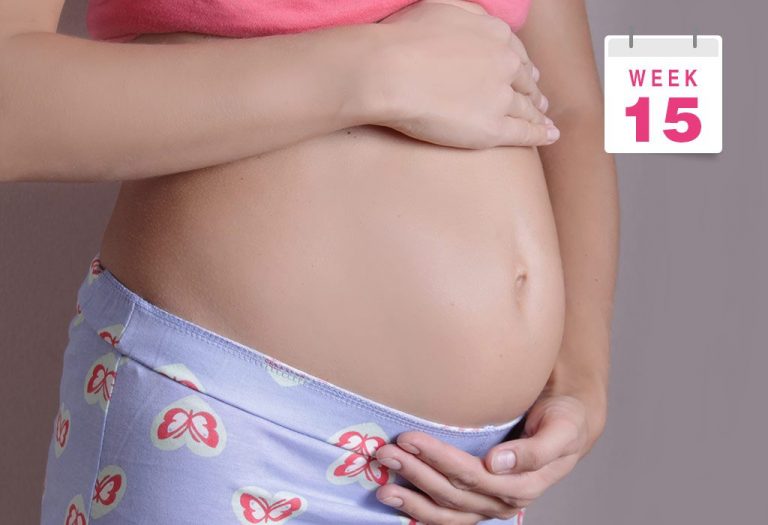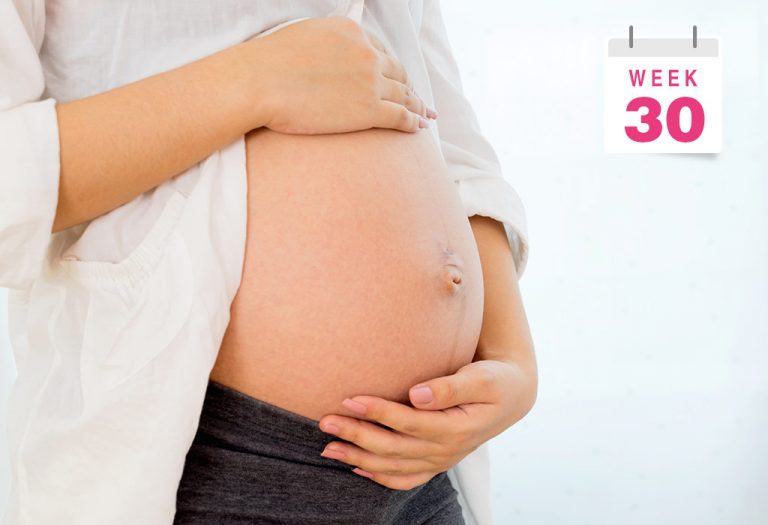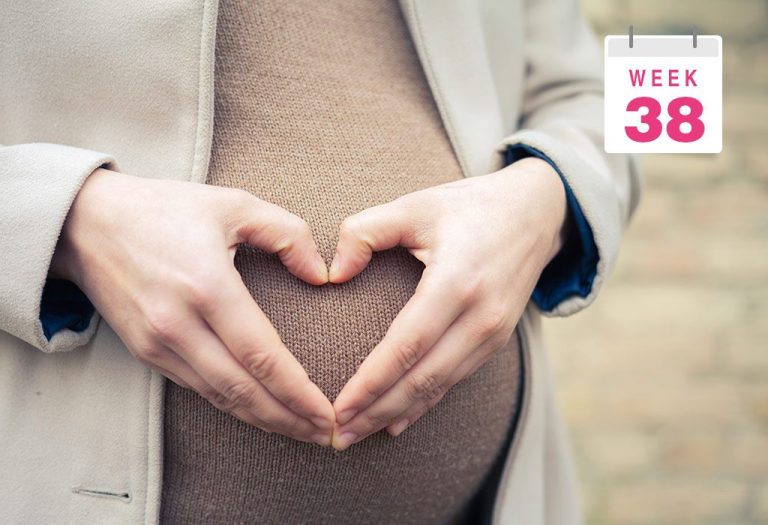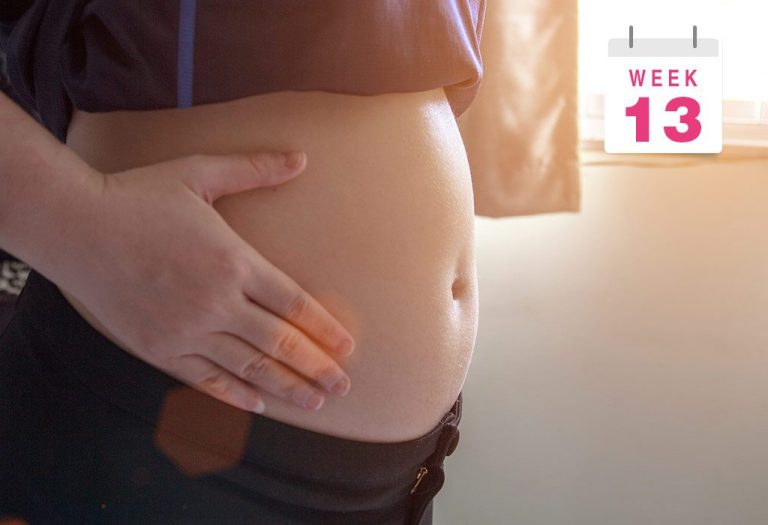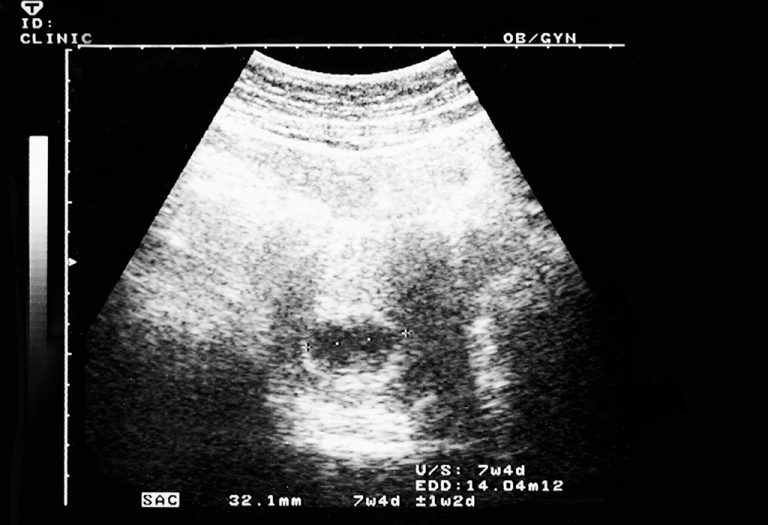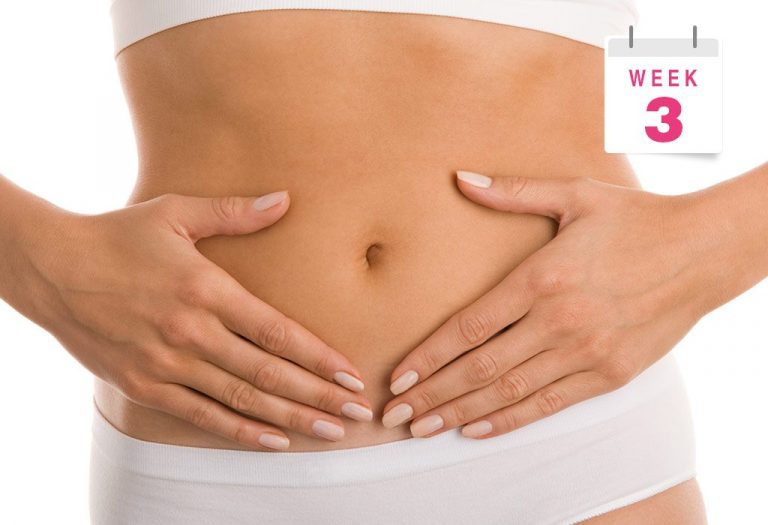15 Weeks Pregnant: Symptoms, Ultrasound & Belly Size

- Your Baby’s Growth During Pregnancy – Week 15
- 15 Week Pregnant Is How Many Months?
- What Is the Size of the Baby at 15 Weeks?
- Common Bodily Changes
- Symptoms of Pregnancy at Week 15
- Belly at 15 Weeks of Pregnancy
- Ultrasound Scan at 15 Weeks of Pregnancy
- What to Eat
- Care Tips
- What You Need to Shop For
- When to See the Doctor
- FAQs
At 15 weeks, you have successfully completed the first trimester of your pregnancy and are well into your second one. Morning sickness should subside by now, and your aversion to smells and food must be under control. By the 15th week of pregnancy, you will feel more energetic and may also notice that your appetite and libido will be restored (1). What’s more? You may start craving some action; the best part is that your little one will not be affected by it. A lot is happening in the 15-week gestation, and we want to tell you all about it. So, scroll down and learn how your baby will grow and what you should eat and avoid when you are fifteen weeks pregnant.
Your Baby’s Growth During Pregnancy – Week 15
The 15-week fetus size is about the size of an orange or an apple. At the onset of the 15th week, your baby will have started developing eyebrows, hair, and skin. More importantly, your baby’s skeleton is beginning to form properly, though it still, more or less, feels like soft cartilage. The bones for their ears are also beginning to develop (2).
In a nutshell, your baby definitely looks more like a fully formed human being. The ears will be positioned at the side of the head as they normally should be, and the eyes will be placed on the face. It’s possible that you may start feeling your baby moving and flexing in your tummy while working on sucking, swallowing, and breathing.
15 Week Pregnant Is How Many Months?
Since pregnancy is 40 weeks long—a bit longer than the actual nine months—doctors prefer to track the pregnancy progress in weeks. 15 weeks pregnancy means you are three months pregnant.
What Is the Size of the Baby at 15 Weeks?

Since your baby is barely as big as an apple when you are 15 weeks pregnant, your baby’s size is only around 3-4 inches long, and like an orange, your baby weighs only around 50 to 60 grams. However, you can rest assured that your baby still has his/her organs in place, maturing each day.
In a nutshell, your baby is growing rapidly at the onset of the 15th week and should already be making it hard for you to catch your breath as your body has started working hard to accommodate the growing baby.
Common Bodily Changes
As your baby’s body is steadily changing in the 15th week, it is normal to expect body changes during pregnancy in yourself as well. Besides all the changes that your body has already undergone, you can look forward to the following changes:
- Your baby bump should be more pronounced and the good news is that it is only going to grow more rotund.
- Since your body is beginning to work hard to accommodate your baby’s body, you may start feeling congested from time to time.
- Ideally, this is the time when you should be looking forward to gaining some weight.
- If you have not invested in maternity wear yet, your normal clothes might start to feel constrictive.
- You will notice a darkening of the area around your nipples.
Symptoms of Pregnancy at Week 15
At every stage of pregnancy, you will experience new symptoms. It’s needless to say that the 15th week will be no different. Some of these symptoms may include:
- Sex Drive: This is officially the new symptom of the 15th week of your pregnancy. For the last few months, you may have been feeling sick and moody and would also have avoided sex. With the onset of the 15th week, you should feel energetic enough to indulge in some pleasure.
- Sensitivity to Smells: Your nasal passages will tend to be more sensitive. With an increase in the volume of blood, you may experience nosebleeds.
- Shortness of Breath: You will also see that you will be short of breath as your body is trying to accommodate another human being.
- Indigestion/Heartburn: This is another symptom that you will definitely experience as your hormones do their trick and relax the muscles in the digestive system.
- Bleeding Gums: You may notice red, swollen, and extremely sensitive gums at this point in your pregnancy. This mostly happens because of the pregnancy hormones that induce gingivitis (inflammation of the gums). You may also notice a small bump like a benign pregnancy tumour; however, it is completely painless and harmless. If you develop this, it will normally fade away after delivery.
Other symptoms include increased vaginal discharge, urinary infection, swollen and bleeding gums, headaches, dizziness, swollen hands and feet, itchy skin, thicker and shinier hair, or dark patches on the face (3).
Belly at 15 Weeks of Pregnancy
For most of you, your baby bump should be showing, especially if this is not your first pregnancy. For first-time mothers, there is also a chance that you might still not be showing much or can at least cover up the tell-tale signs well.
In any event, the 15th week of pregnancy marks quite the transition in your second trimester and pregnancy. You should really gear up for your uterus to no longer fit well inside the pelvis. At the onset of the 15th week, it should already be stretching to accommodate your baby.
Ultrasound Scan at 15 Weeks of Pregnancy
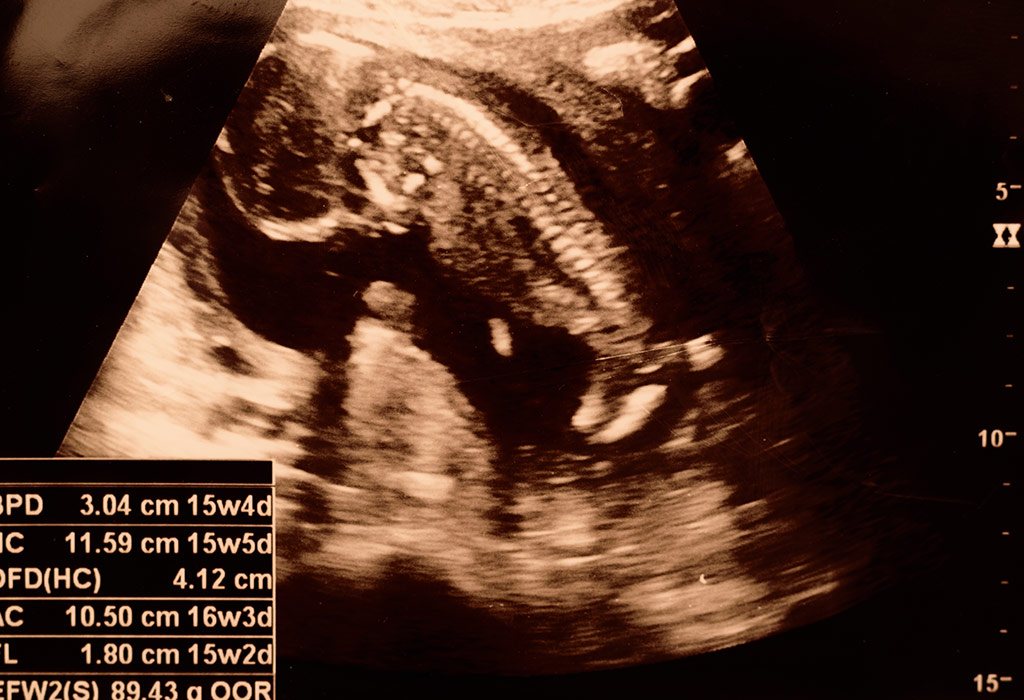
This week’s ultrasound will reveal that your baby is doing a whole lot of stretching without you even realizing it. Now that all the limbs and joints of your baby are more formed, your baby will definitely squirm a lot inside your body. The maximum that you will ever feel from these activities would probably be a butterfly or bubble-like sensation inside your belly. It is also noteworthy that your baby is also likely to have a bout of hiccups in there.
What to Eat
Among all the things that will worry you, the 15th-week pregnancy food menu will definitely feature at the top of the list. What may also stress you out about eating correctly is that you are no longer eating only for yourself but for another human being that’s steadily growing. Before you fret, check out the list of what to eat as a suggestion (4).
- Include a good portion of whole fruits and leafy green vegetables in your diet.
- Don’t forget to include a little starch from bread and iron-fortified cereals.
- Include milk and dairy products in your diet as you need calcium for the bone growth of the baby.
- Round off your food worries with a good helping of proteins, especially lean meats, oily fish, eggs, etc. A small portion of well-cooked red meat will also help you get essential proteins.
- Eat well-cooked eggs to get some Omega-3 fatty acids.
Care Tips
It should come as no surprise that now is the time you keep yourself and your baby safe and sound. It is never too much to make wise lifestyle choices in order to give birth to a healthy baby (5).
Dos
- Stay hydrated
- Get plenty of rest and regular hours of sleep
- Eat a proper portion of food at the right time
- Take medication as prescribed by your doctor
- Exercise in moderation to deal with aches
Don’ts
- Expose yourself to places that are contaminated or dirty
- Overdo workouts
- Take medication without consulting your doctor
- Think negative
- Starve yourself or your baby
What You Need to Shop For
When it comes to having a baby, your shopping list will obviously be endless. However, let’s examine a practical list that will come in handy.
- Comfortable shoes, preferably flats.
- Body pillows to help you sleep when you experience pain or aches.
- Healthy snacks to keep you fit and satiate your hunger.
- Books on pregnancy and parenthood.
- Comfortable maternity clothes. Brands like Bella Mama have a variety of maternity wear, such as printed kurtas, maternity ethnic wear, nursing bras and nighties (which can also come in handy after your child is born), maternity tops, night suits, maternity leggings, palazzos, track pants, etc.
- Lotions and moisturizers because your skin may tend to get dry.
When to See the Doctor
You will continue to have routine prenatal checkups in your second trimester, for which you’ll have to book appointments. However, if you suddenly feel any new discomfort or any of the following symptoms listed below, you must consult a doctor without any delay:
- Vaginal bleeding
- Severe cramping
- Severe vomiting
- Fever
- Changes in vaginal discharge
- Dizziness or fainting
FAQs
1. Can I feel my baby at 15 weeks?
Quickening is a phenomenon in which a pregnant woman starts to feel fetal movement in her uterus. It usually begins around 16 to 20 weeks in pregnancy, but some women may experience it before or after that time period; all is considered normal (6). Although rare, it is possible to experience your baby’s movements in the 15 weeks, but if not, we suggest waiting for some more.
2. How to relieve heartburn during pregnancy?
Acid reflux or heartburn is a common pregnancy symptom, which feels like a burning sensation. To relieve it during pregnancy, try sitting upright for at least two hours after your meal, avoid acidic fruits and foods, scatter your meals throughout the day instead of having a big meal, avoid big meals before going to bed, and avoid caffeine (7). You can consult your doctor for medications to provide you relief from heartburn.
3. What is pregnancy brain, and when does it start?
Pregnancy brain can begin at any stage of pregnancy because it is caused by a combination of changing hormones and a general change in priorities in a pregnant person’s life (all of a sudden, a lot of your mental energy is being spent on worrying about the baby, track prenatal appointments, create a registry, plan a nursery, etc.). Some commonly observed pregnancy-related brain symptoms are impaired focus, memory issues, and absentmindedness. These symptoms may worsen if you’re dealing with stress or sleep loss, both of which are common during pregnancy (8).
Staying informed and positive during pregnancy can make your pregnancy journey easier, and you will be able to enjoy every minute of your journey to motherhood.
References/Resources:
1. 15 Weeks Pregnant; American Pregnancy Association; https://americanpregnancy.org/healthy-pregnancy/week-by-week/15-weeks-pregnant/
2. Pregnancy at week 15; Pregnancy Birth & Baby; https://www.pregnancybirthbaby.org.au/pregnancy-at-week-15
3. Week 15; NHS; https://www.nhs.uk/start-for-life/pregnancy/week-by-week-guide-to-pregnancy/2nd-trimester/week-15/
4. An Essential Guide on What to Eat During Pregnancy; Family Health Centers of San Diego; https://www.fhcsd.org/prenatal-care/what-to-eat-during-pregnancy/
5. Pregnancy and diet; BetterHealth Channel; https://www.betterhealth.vic.gov.au/health/healthyliving/pregnancy-and-diet
6. Quickening in Pregnancy; Cleveland Clinic; https://my.clevelandclinic.org/health/symptoms/22829-quickening-in-pregnancy
7. How Can I Deal With Heartburn During Pregnancy?; Nemours KidsHealth; https://kidshealth.org/en/parents/heartburn.html
8. Week 15; Tommy’s; https://www.tommys.org/pregnancy-information/im-pregnant/pregnancy-week-by-week/15-weeks-pregnant
Previous Week: 14 Weeks Pregnant
Next Week: 16 Weeks Pregnant
Was This Article Helpful?
Parenting is a huge responsibility, for you as a caregiver, but also for us as a parenting content platform. We understand that and take our responsibility of creating credible content seriously. FirstCry Parenting articles are written and published only after extensive research using factually sound references to deliver quality content that is accurate, validated by experts, and completely reliable. To understand how we go about creating content that is credible, read our editorial policy here.







